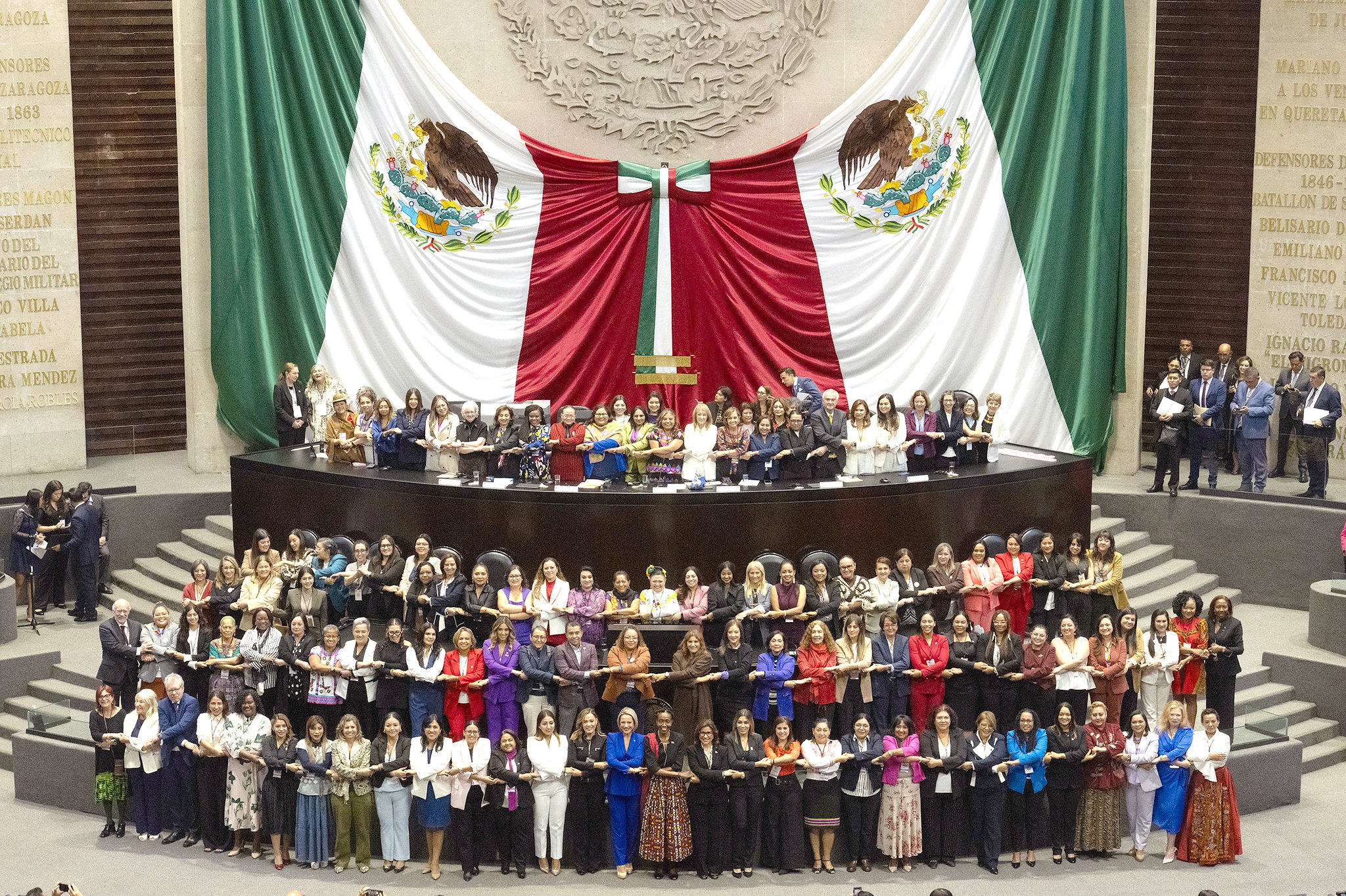Latin American and Caribbean Legislators Play a Crucial Role for Making Progress on Care Policies in the Region
Work area(s)
The Parliamentary Forum of Latin America and the Caribbean within the framework of the XVI Regional Conference on Women in Latin America and the Caribbean – inaugurated at the San Lázaro Legislative Palace in Mexico City – was organized by the Congress of the Union, UN Women and ECLAC.

The crucial role of the region’s legislators for advancing towards the care society was emphasized today at the inauguration of the Parliamentary Forum of Latin America and the Caribbean within the framework of the XVI Regional Conference on Women in Latin America and the Caribbean, organized by Mexico’s Congress of the Union, UN Women and ECLAC at the San Lázaro Legislative Palace in Mexico City.
Participating in the opening ceremony were Senator Martha Lucia Mícher Camarena, President of the Gender Equality Commission of the Senate of the Republic of Mexico; Deputy Anaís Miriam Burgos Hernández, President of the Gender Equality Commission of the Chamber of Deputies of Mexico; Sima Bahous, United Nations Under-Secretary-General and Executive Director of the United Nations Entity for Gender Equality and the Empowerment of Women (UN Women); José Manuel Salazar-Xirinachs, Executive Secretary of the Economic Commission for Latin America and the Caribbean (ECLAC); Raquel Serur Smeke, Undersecretary for Latin America and the Caribbean at the Ministry of Foreign Affairs of Mexico; Rosa Icela Rodríguez Velázquez, Minister of the Interior of Mexico; and Citlalli Hernández Mora, Minister for Women of Mexico.
“This forum is not just an appointment on the calendar, but rather a key political platform for thinking collectively about how to ensure that parity can stop existing as a rule on paper and become a lived reality, and how the relevant problem of care can acquire a broad social dimension,” Senator Martha Lucia Mícher Camarena indicated.
Deputy Anaís Miriam Burgos Hernández stressed the urgent need to build a care system and urged the region’s women lawmakers to be ambassadors for care and for substantive equality in their countries. “Together let’s build a Latin America and the Caribbean full of liberty for the coming generations,” she said.
“Let’s continue moving towards a formal equality that is translated into transformed lives, into dignity for all women and girls, and together let’s build a region where equality is not the exception, but rather the principle, the norm, that guides each law, each policy and each system,” Sima Bahous, Executive Director of UN Women, proposed.
ECLAC’s Executive Secretary, José Manuel Salazar-Xirinachs, affirmed that the Parliamentary Forum of Latin America and the Caribbean ratifies Mexico’s commitment to multilateralism and regional integration, and underscores its status as a regional leader on the path to building parity democracies, and “parity in everything.”
ECLAC’s highest authority indicated that currently, at least 16 countries in Latin America and the Caribbean have made regulatory progress on care matters, and eight countries (Brazil, Colombia, Costa Rica, Cuba, Ecuador, Panama, Uruguay and Venezuela) have passed specific laws to create care policies and systems. He also welcomed the recent Advisory Opinion by the Inter-American Court of Human Rights on the content and scope of the right to care. “With 129 written observations presented, including those made by ECLAC, the resolution is of historic relevance since this is the first regional Court to recognize the right to care as an autonomous human right: the right to provide care, to be cared for, and to exercise self-care,” he said.
“We hope the debates at the Parliamentary Forum of Latin America and the Caribbean will be fruitful, strengthening dialogue between countries and contributing to consolidating a vision of the care society and gender equality that is shared by the entire region’s legislative branches. We have covered a lot of ground, but there is still much more to cover. We would not have gotten this far if it weren’t for the boldness, courage and conviction of innumerable women such as yourselves. It is time to continue working,” he concluded.
Mexico’s Minister for Women, Citlalli Hernández Mora, asserted that it is necessary to keep defending women’s rights and to say no to the rollback attempts that exist in many parts of the world where rights advancements are being questioned. For that reason, in the context of the Forum, this representative of the Government of Mexico also applauded the Advisory Opinion by the Inter-American Court of Human Rights.
Regarding legislative work, the Minister for Women added that this meeting space is conducive to discussing how we build a care society on the understanding that historically the role assigned to women has been, among others, that of providing care.
Raquel Serur Smeke, Undersecretary for Latin America and the Caribbean, stated that “gender equality is not achieved solely by fighting patriarchy, discrimination and violence; it will be built by ensuring real conditions that enable all women and men to fully develop.” She added: “Recognizing, redistributing and remunerating care is recognizing human dignity and the right of all people to receive and provide care, without this entailing inequality, poverty or discrimination.”
Mexico’s Interior Minister, Rosa Icela Rodríguez Velázquez, emphasized that “women occupy a fundamental place in Mexico now, our voices are heard, we are no longer invisible. We have gender parity in the legislative branch. For the first time in our country’s history, a woman is holding the Presidency of the Republic and we have a parity cabinet.” She declared: “This is a transformative movement on which there is no going back.”
At this event, the document The right to care in Latin America and the Caribbean: Progress on the regulatory front was presented, which was prepared by ECLAC in conjunction with UN Women and the International Labour Organization (ILO).
During the presentation, Ana Güezmes, Director of ECLAC’s Division for Gender Affairs, explained that “the human right to care (to care for, to be cared for and to exercise self-care) is part of the human rights already recognized in pacts and treaties. In this right the value of the work and the rights of the people who provide care is recognized, moving beyond the stereotyped assignment of care as a woman’s responsibility. And progress is made on recognizing social co-responsibility among those who provide it (State, market, community, families) and on the State’s central role in guaranteeing the right to care.”
On August 12-15, 2025 in Mexico City, the XVI Regional Conference on Women in Latin America and the Caribbean will bring together senior authorities from Mexico and elsewhere in the region, along with representatives of multilateral organizations, academia, parliaments and civil society – particularly women’s and feminist organizations and movements.
Organized since 1977 by ECLAC, which serves as the Secretariat, and since 2020 in coordination with UN Women, the Conference will address “political, economic, social, cultural and environmental transformations as a means of advancing the care society and gender equality.”
During this event, which will be held at the Centro Cultural Universitario Tlatelolco in Mexico City, ECLAC will present the position paper The Care Society: Governance, Political Economy and Social Dialogue for a Transformation with Gender Equality, which will guide the participants’ debates.
Related content
Related event

XVI Regional Conference on Women in Latin America and the Caribbean
<p>The sixteenth session of the Regional Conference on Women in Latin America and the Caribbean was held at the Centro Cultural Universitario Tlatelolco in Mexico City, from 12 to 15 August 2025, and…
Subregional headquarter(s) and office(s)
Type
Related link(s)
Contact
Public Information Unit
- prensa@cepal.org
- (56 2) 2210 2040
